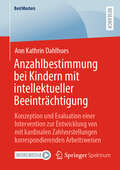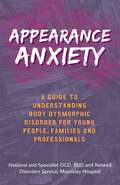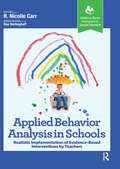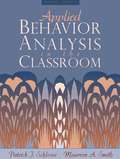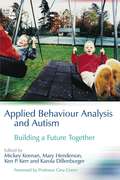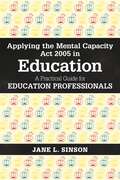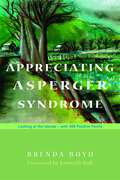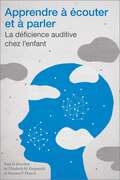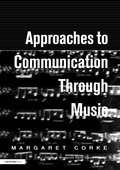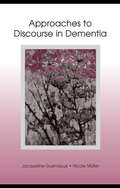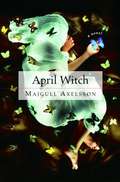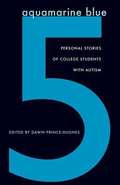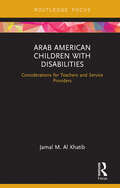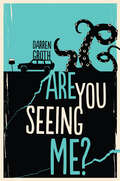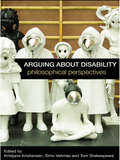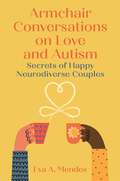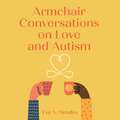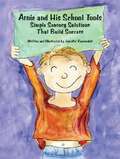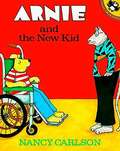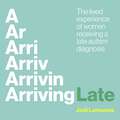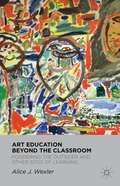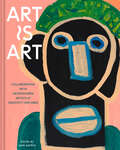- Table View
- List View
Anzahlbestimmung bei Kindern mit intellektueller Beeinträchtigung: Konzeption und Evaluation einer Intervention zur Entwicklung von mit kardinalen Zahlvorstellungen korrespondierenden Arbeitsweisen (BestMasters)
by Ann Kathrin DahlhuesIm Rahmen des Forschungsprojektes wird der Frage nachgegangen, wie sich die Arbeitsweisen zur Anzahlbestimmung bei Kindern mit intellektueller Beeinträchtigung unter Berücksichtigung der kardinalen Zahlvorstellung während einer Förderung der Menge-Zahl-Zuordnung entwickeln. Dabei liegt der Fokus auf der Bestimmung strukturiert dargestellten Anzahlen innerhalb des Zwanzigerfeldes. Um diese Frage beantworten zu können, wurde eine Einzelfallstudie mit zwei Kindern des dritten Schulbesuchsjahres einer Förderschule mit dem Schwerpunkt geistige Entwicklung durchgeführt (ZR6 und ZR20). Die Studie umfasste eine Prä- und Post-Standortanalyse, Einzelfördereinheiten sowie Verlaufstestungen. Der Fokus der Fördereinheiten lag auf der Mengenwahrnehmung, dem Zählen und der Herstellung von Beziehungen zwischen den Zahlen unter Berücksichtigung des intermodalen Transfers. Es zeigt sich, dass die Kinder strukturiert dargestellte Anzahlen nicht mehr immer zählend beantworten, sondern überwiegend die direkte Anzahlnennung nutzen. Auch die Strukturen des Zwanzigerfeldes können immer mehr erkannt und genutzt werden. Dennoch gibt es sowohl Schwankungen in der Lösungshäufigkeit als auch in der Lösungsgeschwindigkeit.
Appearance Anxiety: A Guide to Understanding Body Dysmorphic Disorder for Young People, Families and Professionals
by The National ServiceThe first book for teens that explains the causes and impact of body dysmorphic disorder (BDD). The book is interspersed with accounts and artwork from young people with BDD, along with perspectives of their families. BDD is a debilitating mental health disorder, and this book gives advice on treatment including CBT and medication, and shows where to get help.It increases awareness, provides solidarity for people with BDD, and alerts others to key signs and symptoms so they can prevent further suffering. It also includes a short section for families and professionals on what they can do to help, making this the go-to book for professionals and families to recommend to teens, as well an invaluable resource for young people themselves.
Applied Behavior Analysis in Schools: Realistic Implementation of Evidence-Based Interventions by Teachers (Evidence-Based Instruction in Special Education)
by R. CarrMost applied behavior analysis (ABA) texts rely heavily on research findings and technical theory, making them inaccessible for use by everyday teachers. Applied Behavior Analysis in Schools: Realistic Implementation of Evidence-Based Interventions by Teachers aims to be the missing link between books on classroom interventions within teacher preparation programs. Dr. R. Nicolle Carr leverages her years of expertise with ABA and channels it into creating practical, realistic working models of ABA that any teacher can use. Her “by teachers, for teachers” approach to writing effectively outlines ABA strategies so that they can be used with few resources and minimal training. Applied Behavior Analysis in Schools is tailored toward future and current educators to enable them to learn invaluable tools like how to effectively take data in a classroom to help with academic performance or behavior management—without requiring them to possess a background in ABA. What’s included in Applied Behavior Analysis in Schools:• Chapters on Acceptance and Commitment Therapy• The role of cultural considerations and collaboration skills• Use of ABA in transition skills• Applying ABA to academics and an overview of assessmentsIncluded with the text are online supplemental materials for faculty use in the classroom. Applied Behavior Analysis in Schools: Realistic Implementation of Evidence-Based Interventions by Teachers takes the concepts of ABA and presents them to teachers in a way that is both approachable and applicable.
Applied Behavior Analysis in the Classroom (Second Edition)
by Patrick J. Schloss Maureen A. SmithWritten for professionals in both general and special education, this book is a complete description of applied behavior analysis and how it can be used with students displaying a range of behaviors.
Applied Behaviour Analysis and Autism: Building A Future Together
by Mary Henderson Mickey Keenan Karola Dillenburger Ken P. KerrApplied Behaviour Analysis (ABA) is an effective behavioural treatment programme widely used with children with autism to improve socially significant behaviours. This practical book gives detailed guidance on how to develop a tailored ABA programme that includes the key features of ABA: detailed individual behaviour assessment, reinforcement strategies to encourage new behaviours and systematic programme implementation. Chapters also include individual family case studies and discuss relevant issues such as day-to-day management of programmes for both younger and older children, collaboration in the community, sibling support, school-based programmes and obtaining services. The international contributors offer practical advice on the approach needed for the successful implementation of ABA. Applied Behaviour Analysis and Autism will be a key resource for parents, teachers, social workers, psychologists, researchers, nurses, health visitors and anyone with an interest in improving the ability to cope with the world of children with autism.
Applying the Mental Capacity Act 2005 in Education: A Practical Guide for Education Professionals
by Jane L. SinsonThis straightforward book explains the introduction of the Mental Capacity Act 2005 (MCA) and its code of practice (COP) as part of the Children and Families Act 2014 and the accompanying SEND COP in England. This is the first comprehensive book to explain to education professionals the legal requirement to follow the MCA COP and SEND COP guidelines when formally considering a young person's (16 - 25) capacity to make decisions about their education. Using education-focussed case studies throughout to illustrate key points, this practical guide explains the MCA five principles, defines the term 'mental capacity' and clarifies the circumstances in which a young person would lack capacity to make a decision. It describes when a capacity assessment is likely to be required and presents a step-by-step guide to undertaking a capacity assessment. This is the essential guide to the MCA for FE college tutors, post 16 teachers, specialist teachers, local authority SEN officers and educational psychologists.
Appreciating Asperger Syndrome: Looking at the Upside - with 300 Positive Points
by Brenda Boyd Kenneth HallPeople with Asperger Syndrome have many characteristics that are frequently seen in a negative light. Brenda Boyd shows that for every characteristic of AS that can be looked at negatively, there are several positive aspects that can be drawn on and developed. Discussing AS in general terms, she talks through the reasons why people with AS approach life in the way they do, and what an enormous contribution they make to the world. She then explores different characteristics of AS; while she acknowledges the negative perception so many people have of these characteristics, she points out the large number of advantages to the Aspergers way of thinking for individuals with AS, those around them and society as a whole. For every negative, Boyd proves there are many more positives. From their refreshing honesty to their originality and potential to become leaders rather than followers, people with AS have many admirable personality traits that should be nurtured. This book shows that by adjusting our perceptions of what is 'normal' and embracing diversity, AS can not only be understood and accepted, but appreciated. Appreciating Asperger Syndrome is a celebration of AS which should be read by individuals with AS, family members, and anyone who knows or works professionally with individuals with AS.
Apprendre à écouter et à parler: La déficience auditive chez l’enfant (Éducation)
by Elizabeth M. Fitzpatrick et Suzanne P. DoucetLa déficience auditive a un impact considérable sur plusieurs aspects du développement de l’enfant, y compris sur les habiletés de communication, l’apprentissage scolaire, les habiletés sociales et, au final, la qualité de vie de l’enfant et de sa famille. Par le passé, la déficience auditive présentait des obstacles presque insurmontables. De nos jours, la technologie et les techniques d’intervention permettent de mieux répondre aux besoins des enfants ayant une perte d’audition, et donc de les aider à devenir des membres à part entière de la société. Le dépistage précoce et la technologie d’amplification auditive font en sorte que nous vivons à présent une période charnière dans le domaine de l’éducation des enfants ayant une surdité. Cette éducation nécessite tout de même une intervention spécialisée de la part d’une équipe de professionnels, et ce, en collaboration étroite avec les parents. Compte tenu des approches novatrices dans le développement de méthodes d’apprentissage du langage verbal chez les enfants présentant des troubles de l’audition, la communauté internationale mise davantage sur la formation et le perfectionnement des professionnels. Appuyées par une équipe multidisciplinaire d’experts dans le domaine, les deux auteures abordent les principales problématiques médicales, technologiques, éducatives et sociales liées à ces troubles.Publié en français
Approaches to Communication through Music
by Margaret CorkeOne of the ways forward when working with those who have little or no speech, or limited comprehension of language, is to use music. In this book tried and tested approaches and activities devised to promote the development of communication and social interaction at a fundamental level are clearly set out. The ethos behind this manual is a person-centered approach, within a structured framework and allowing for differentiation and improvisation according to the learner's individual needs and developmental levels. This is a practical guide that contains lots of ideas and original activities for the specialist and non-specialist alike. It provides original songs and music scores, activities and games, and suggestions for group work for learners at a variety of levels.This book will be helpful to teachers, carers, therapists and parents who work or live with people with severe or profound and multiple learning difficulties. Music teachers and coordinators working in mainstream early years and primary education will also find the songs and activities useful.
Approaches to Discourse in Dementia
by Nicole Muller Jacqueline A. GuendouziThe qualitative analysis of naturally occurring discourse in neurogenic communication disorders, specifically in dementia studies, has experienced recent burgeoning interest from wide-ranging disciplines. This multidisciplinarity has been exciting, but has added contextual confusion. This book advances the study of discourse in dementia by systematically exploring and applying different approaches to the same free conversational data sets, collected and transcribed by the authors. The applied methodologies and theories comprise a useful sourcebook for students, researchers, and practitioners alike.
Approaches to the Evolution of Language: Language in Prehistory
by Alan BarnardFor ninety per cent of our history, humans have lived as 'hunters and gatherers', and for most of this time, as talking individuals. No direct evidence for the origin and evolution of language exists; we do not even know if early humans had language, either spoken or signed. Taking an anthropological perspective, Alan Barnard acknowledges this difficulty and argues that we can nevertheless infer a great deal about our linguistic past from what is around us in the present. Hunter-gatherers still inhabit much of the world, and in sufficient number to enable us to study the ways in which they speak, the many languages they use, and what they use them for. Barnard investigates the lives of hunter-gatherers by understanding them in their own terms, to create a book which will be welcomed by all those interested in the evolution of language.
April Witch
by Majgull AxelssonIn 1947 Ella Johansson gives birth to a child with severe cerebral palsy, and, on the doctor's advice, confines her to an institution and keeping her existence a secret. Later she becomes foster mother to three girls, each of whom was abandoned or abused. In their fifties these four "sisters," all related through their connection to Ella, try to make sense of their histories and to sort out their relationships with one another. Desiree, the "April witch" of the title, has the power to leave her body and enter the mind of another. Apart from these supernatural flights, her life in a series of institutions is depicted with painful realism. This is a thought-provoking novel, full of richly realized characters, which explores the profound need for unconditional love in childhood.
Aquamarine Blue 5: Personal Stories of College Students With Autism
by Dawn Prince-HughesThe first book to be written by autistic college students who have been diagnosed with Asperger's Syndrome, or High Functioning Autism, Aquamarine Blue 5 demonstrates their unique way of looking at and solving problems and the challenges they face. These readable essays detail the struggles of a highly sensitive group and show that there are gifts specific to autistic students that enrich the university system, scholarship, and the world as a whole. Containing the stories of a dozen autistic students, the book deals with everything from learning to eat in dormitory dining halls to making friends to exploring sexuality.
Arab American Children with Disabilities: Considerations for Teachers and Service Providers
by Jamal M. Al KhatibDespite a proliferation of special education literature on racial minorities over the past three decades, research and writing on Arab American children with disabilities remain remarkably sparse. This book fills that gap by promoting culturally appropriate services for Arab American children with disabilities. Special education and service providers in the U.S.—including school psychologists, rehabilitation counselors, and social workers—are increasingly likely to work with Arab Americans with disabilities. By focusing on this marginalized minority population, Al Khatib provides much-needed context and direction for service providers and researchers working with the Arab American community. Offering an overview of special education and the rights guaranteed under the Individuals with Disabilities Education Act (IDEA), this book also helps Arab American families understand the special education process and advocate for their children.
Are You Blind
by Lilli NielsenThis book is used with the Active Learning approach. It is intended for parents, teachers, and caregivers. Dr. Nielsen has done an outstanding job with this book.
Are You Seeing Me?
by Darren GrothTwins Justine and Perry have left their home in Australia and embarked on the road trip of a lifetime in the Pacific Northwest. <P><P> It's been a year since their dad lost his battle with cancer and Justine became the sole caregiver for her autistic brother, Perry. Now Perry has been accepted into an assisted-living residence in their hometown, Brisbane, Australia, but before he takes up residence, they're seeking to create the perfect memory. <P><P> For Perry, the trip is a glorious celebration of some of his favorite things: Ogopogo, Jackie Chan movies and earthquakes. For Justine, it's an opportunity to learn how to let go--of Perry, of her boyfriend, Marc--and to offer their mother the chance to atone for past wrongs. <P><P> But the instability that has shaped their lives will not subside, and the seismic event that Perry forewarned threatens to reduce their worlds to rubble...
Arguing about Disability: Philosophical Perspectives
by Tom Shakespeare Kristjana Kristiansen Simo VehmasDisability is a thorny and muddled concept - especially in the field of disability studies - and social accounts contest with more traditional biologically based approaches in highly politicized debates. Sustained theoretical scrutiny has sometimes been lost amongst the controversy and philosophical issues have often been overlooked in favour of the sociological. Arguing about Disability fills that gap by offering analysis and debate concerning the moral nature of institutions, policy and practice, and their significance for disabled people and society. This pioneering collection is divided into three sections covering definitions and theories of disability; disabled people in society and applied ethics. Each contributor – drawn from a wide range of academic backgrounds including disability studies, sociology, psychology, education, philosophy, law and health science – uses a philosophical framework to explore a central issue in disability studies. The issues discussed include personhood, disability as a phenomenon, social justice, discrimination and inclusion. Providing an overview of the intersection of disability studies and philosophical ethics, Arguing about Disability is a truly interdisciplinary undertaking. It will be invaluable for all academics and students with an interest in disability studies or applied ethics, as well as disability activists.
Armchair Conversations on Love and Autism: Secrets of Happy Neurodiverse Couples
by Eva A. MendesFilled with first-hand accounts and the best kept secrets to help your relationship bloom, this book is a deep dive into loving autistic relationships and the unique strengths that drive them.Based on clinical experience and emerging research, ASC counselling expert Eva Mendes explores the complex and fulfilling relationships between neurodiverse couples. This book takes you on a journey into the relationships of 20 neurodiverse couples from all walks of life, offering insight into how they meet the challenges of daily life and the unique strengths being neurodiverse can bring to a being a partner or co-parent. The couples share down-to-earth and candid recollections of the ups and downs of their relationships, weighing in on topics from emotional connection and sex to managing co-parenting and finances.Exploring multiple intersections from race, gender and sexuality across autistic relationships, and ironing out the common myths surrounding them, Eva offers a specialist, clinical perspective on each dynamic and provides examples of best practice to have a healthy and happy relationship.
Armchair Conversations on Love and Autism: Secrets of Happy Neurodiverse Couples
by Eva A. MendesNeurodiverse couples share personal accounts of the ups and downs of being in an AS relationshipFilled with first-hand accounts and the best kept secrets to help your relationship bloom, this audiobook is a deep dive into loving autistic relationships and the unique strengths that drive them.Based on clinical experience and emerging research, ASC counselling expert Eva Mendes explores the complex and fulfilling relationships between neurodiverse couples. This audiobook takes you on a journey into the relationships of 20 neurodiverse couples from all walks of life, offering insight into how they meet the challenges of daily life and the unique strengths being neurodiverse can bring to a being a partner or co-parent. The couples share down-to-earth and candid recollections of the ups and downs of their relationships, weighing in on topics from emotional connection and sex to managing co-parenting and finances.Exploring multiple intersections from race, gender and sexuality across autistic relationships, and ironing out the common myths surrounding them, Eva offers a specialist, clinical perspective on each dynamic and provides examples of best practice to have a healthy and happy relationship.(P)2024 Jessica Kingsley Publishers
Arnie and His School Tools: Simple Sensory Solutions That Build Success
by Jennifer VeenendallThis text describes an exuberant little boy who had difficulty paying attention in class and doing his school work until he was equipped with the tools to accommodate his sensory needs. This book describes some of the sensory tools and strategies he uses at school and home to help him achieve an optimal level of alertness and performance. Image descriptions present.
Arnie and the New Kid
by Nancy CarlsonEverybody at school is a little bit afraid of Philip because he's different from them. But only Arnie teases Philip. Then, one day Arnie's teasing gets out of hand and leads to an accident that keeps Arnie off his feet-just like Philip. It's not long before Arnie discovers that you can be different and still be a lot alike-and that's what being friends is all about. Picture description are included. This file should make an excellent embossed braille copy.
Arriving Late: The lived experience of women receiving a late autism diagnosis
by Jodi Lamanna"The stories within this book tell of the journey women take to late autism diagnosis: stories of discovery, strength, self-awareness and belonging."An honest and eye-opening collection of stories from the lives of late diagnosed autistic women across the world, brought together with thoughtful observations from neurodivergent advocate, Jodi Lamanna. Exploring life before and after diagnosis and covering topics such as masking, social interaction, parenting and employment, this book provides much-needed insight into the challenges and successes of late diagnosed women. With chances for reflection on your own experiences, informative diagnosis tips and guidance on what can be done in the future to properly support autistic women, this is an essential read for late diagnosed women and those supporting them.
Art Education Beyond the Classroom
by Alice J. WexlerBy focusing on children and adults with disabilities, each contributor offers critical research which challenges the non-transferable divide between us and them , encouraging art teachers, therapists, critics, and general readers alike to uncover their biases regarding the nature of art and education.
Art Is Art: 40 Years of Collaborating with Neurodiverse Artists at Creativity Explored
by Ann KappesCreativity Explored celebrates its 40th anniversary with a collection of powerful artwork and perspectives from its talented studio artists.This vibrant book uplifts the voices of the artists of Creativity Explored, a nonprofit that gives people with developmental disabilities the opportunity to express themselves through art and share their work with audiences from their local community and in the contemporary art world.This curated collection features more than one hundred original paintings, drawings, illustrations, and sculptures—as well as quotes and stories from the artists—inviting readers to examine and challenge their perceptions about disability. Some artworks are humorous and blunt, while others are affecting and abstract, speaking to the artistic community's diversity and creativity. This book offers an engaging introduction to person-centered thinking for art lovers or anyone interested in learning about disability justice in a visual way.DEMYSTIFYING DISABILITY: This significant new anthology showcases an array of developmentally disabled artists and organizes their works into thematic chapters, such as "Self Medication," "On the Spectrum," "Yes I Do Think About Sex," and "Our Fears." These chapters provide interesting stylistic juxtapositions and personal reflections that highlight both individual and shared experiences as diverse disabled artists. BEAUTIFUL AND CONTENT RICH: This gorgeous hardcover art book features more than one hundred original artworks in full color, from lively portraits and detailed drawings to abstract paintings and captivating illustrations. Quotes, interviews, personal stories, and artist statements also give readers deeper insight into the artists' creative practices, processes, and rituals. This book is a rich visual trove and source of inspiration for any contemporary art lover. SUPPORT A GREAT CAUSE: Creativity Explored was founded in 1983 with the belief that art is essential to life. This book celebrates the organization's mission and its talented artists after forty years of creating impactful arts and career programs with developmentally disabled artists. This collection is a meaningful way to learn more about Creativity Explored and the diverse community it continues to support today.Perfect for:Art lovers and activistsPeople who admire the mission and work of Creativity ExploredThe disabled community, allies, and educatorsGift seekers for family and friends interested in learning more about disability justiceFans of self-taught artists, folk arts, and "outsider art"Contemporary art anthology and art book collectors#OwnVoices readers and anyone interested in diversifying their contemporary art knowledge
Art Not by Eye: The Previously Sighted Visually Impaired Adult in Fine Arts Programs
by Yasha LisencoThe book, in two parts, deal with avenues for adventitiously blind adult, and the blind and severely visually impaired adults in the art program.
